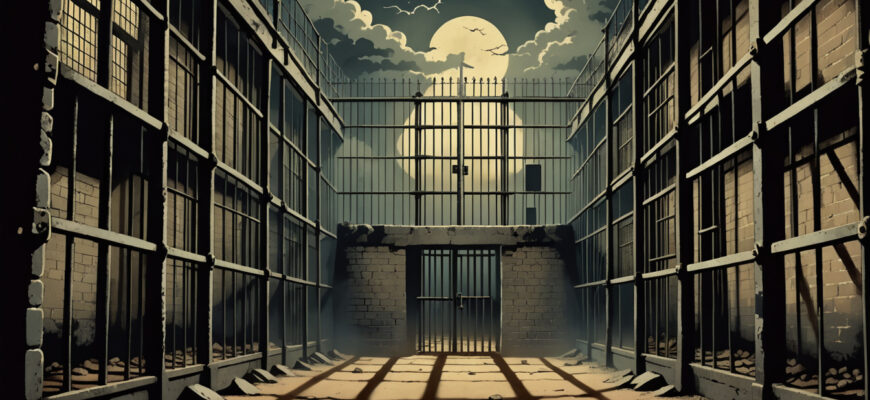Dreams about prison can catch you off guard, leaving a heaviness in your chest that lingers after waking. Why does spending time behind bars, even in sleep, feel so real? These dreams often swing open a door to inner feelings of being stuck, confined, or shut in. Whether it’s a certain relationship, a job, or even your own headspace, dreams of prison bring attention to where life feels limited or stalled. The emotional weight they carry isn’t just about physical walls—it’s a mirror showing the invisible cages created by fear, guilt, and control.
- Understanding Prison Dreams: Emotional Weight And What They Reveal
- Reflective Questions To Ask Yourself
- Layers Of Meaning: Personal And Collective Imprisonment
- The Language Of Liberation In Prison Dreams
- Common Themes and Variations in Prison Dreams
- Typical Scenarios and Their Emotional Roles
- Prison Dream Symbols and What They Mean
- Emotional Responses Within Dreams
- Practical Approaches to Working With Prison Dreams
- Journaling and Dream Analysis
- Using Astrology as a Tool for Healing
- Guided Self-Inquiry: What Walls Are You Ready to Unlock?
- Healing Collective Wounds Through Dreams
- Recognizing Social and Ancestral Patterns in Your Prison Dreams
- Dreaming as a Collective Act of Resistance and Freedom
Understanding Prison Dreams: Emotional Weight And What They Reveal
Prison in dreams usually represents more than just a setting; it’s the embodiment of feelings like being caught in a trap or locked away from freedom. This confinement often points to emotional or mental blocks that might be hard to face during waking hours. You might be wrestling with limitations in your relationships—maybe a friendship feels more like a prison than a refuge, or a work situation drains your sense of autonomy. Sometimes, the battle isn’t with others but within, as anxiety, guilt, or self-doubt build a barricade inside your mind.
That sense of being stuck is rarely subtle. The metaphor of prison taps into a powerful emotional charge, reflecting how intense and overwhelming confinement can feel. Old fears or lingering guilt act like invisible jailers, holding you captive long after the original cause has passed. Control patterns—whether trying to control others or being controlled—show up as these mental bars. The dream’s message is often clear: there’s some part of yourself that’s locked down and craving release.
Reflective Questions To Ask Yourself
- Where do you feel stuck or hemmed in right now?
- What “walls” have you tolerated or built around your heart and mind?
- Could these dreams be inviting you to notice an unseen prison within?
Layers Of Meaning: Personal And Collective Imprisonment
Looking deeper, prison dreams do more than highlight personal struggles—they also echo collective and cultural realities. On a personal level, shame, fear, or self-judgment often play the role of bars. It’s common for these dreams to reflect toxic relationship patterns or the internalized control someone exerts over your life. The feeling of being trapped can stem from many invisible chains grounded in emotional pain and old wounds.
But these dreams rarely end at the individual. Many carry the imprint of collective trauma—entrenched systems of oppression, ancestral wounds passed down like invisible chains, or spiritual bondage from unresolved cultural karma. For those belonging to marginalized communities, especially through a queer or feminist lens, prison symbolism layers additional meaning. It points to multiple experiences of containment: societal, political, and familial. Recognizing these social structures within dreams opens a pathway to empowerment, showing how personal and political prisons intertwine.
| Prison Dream Aspect | Private Meaning | Collective Meaning |
|---|---|---|
| Fear and Shame | Self-judgement and inner criticism | Stigma tied to identity or social expectations |
| Control Patterns | Toxic relationships, self-restrictions | Systems of oppression, cultural conditioning |
| Imprisonment Symbolism | Emotional isolation or mental blocks | Historical trauma, ancestral karma |
The Language Of Liberation In Prison Dreams
Even amid confinement, prison dreams often hold whispers of change and freedom. Those moments where an escape attempt unfolds, or unexpected allies appear in your dreamscape, bring messages of transformation. They hint at the inner invitation to break through limitations and heal old wounds. Dream imagery can spotlight parts of yourself—perhaps creativity or courage—that are longing to be unshackled and reclaimed.
Pay attention to the symbols of release and connection. They are more than just fantasy. They nudge toward reclaiming personal power and remind you that the walls you see can be unlocked. This isn’t about a simple fix; it’s about embracing the courage it takes to tear down barriers, rewrite your story, and step into your sovereignty. Amid uncertainty, the reminder feels alive and steady: you were born for this.
Common Themes and Variations in Prison Dreams
Ever woken up from a dream where you’re locked behind bars, with no control over what’s happening? Prison dreams spin around those feelings—being stuck, restrained, or lost inside situations you can’t shift. They aren’t just about a literal prison, but more often a mirror held up to emotional, mental, or spiritual cages shaping your daytime life.
Typical Scenarios and Their Emotional Roles
Imagine wandering corridors with cold walls, lost or trapped with no key in sight. That feeling of helplessness in such dreams often points to places in your life where you feel powerless—whether under the tight grip of a job that drains you or a relationship where your voice is small.
Interactions range from tense encounters with guards to uneasy camaraderie with fellow prisoners or the biting isolation of solitary confinement. Guards can represent external pressures or authority figures, while fellow inmates might symbolize parts of yourself or people shared struggles with. Solitary confinement, on the other hand, often digs into loneliness and emotional cutoff.
Prison Dream Symbols and What They Mean
The bars, walls, chains, and locked doors you see aren’t random. They’re heavy metaphors for anything blocking your freedom: old fears, limiting beliefs, emotional barriers, or societal constraints. Seeing yourself trying to escape? That’s your inner rebel breaking through invisible chains, signaling a readiness to heal or shift tough situations.
Emotional Responses Within Dreams
Fear pulses through many prison dreams, alongside frustration and helplessness. But don’t miss the pockets of hope or resilience—they matter. These shifting emotions can point to what’s really going on inside: Are you resisting self-imposed restrictions? Wrestling with guilt? Or gathering courage to rewrite your story? These feelings are clues, and listening to them shines wisdom on the wild terrain of your waking struggles.
Practical Approaches to Working With Prison Dreams
Journaling and Dream Analysis
Grab a notebook and write your prison dream immediately after waking. Focus on details: the setting, who was there, your feelings at each moment. Was the prison small or vast? Did you try to escape or negotiate? How did you feel when locked up or interacting with others? Reflective questions afterward can deepen insight:
- What real-life situation feels like a prison?
- Where do you hold yourself back?
- Who or what feels controlling and why?
- What small acts of hope or courage did you notice?
This kind of journaling isn’t just record-keeping; it’s an invitation to dialogue with the subconscious.
Using Astrology as a Tool for Healing
Astrology offers a cosmic lens on your internal prisons. Chart placements might reveal where you carry subconscious blocks, especially in houses related to boundaries (like the 12th or 8th), or planets caught in restrictive aspects. Pay special attention to the lunar cycle:
The New Moon invites planting seeds of freedom and intention to release what confines you, while the Full Moon acts like a spotlight, helping you see what keeps you in chains and what needs letting go. Aligning dream reflection with these cycles can amplify healing and reveal when cosmic energy supports taking bold steps.
Guided Self-Inquiry: What Walls Are You Ready to Unlock?
Try these gentle practices to unveil which prisons are yours to open:
- Identify personal walls—Are you stuck in guilt, stuck in old stories, or patterns repeating?
- Ask yourself: Which of these walls were built by others, and which did I build myself?
- Practice self-compassion by noticing the protective purpose those prisons once served.
- Visualize unlocking one wall at a time, breathing into the fear or freedom that follows.
Empowered action can be as small as speaking a truth or as bold as reclaiming your autonomy over limiting beliefs.
Healing Collective Wounds Through Dreams
Recognizing Social and Ancestral Patterns in Your Prison Dreams
Sometimes, prison dreams aren’t just personal. They echo ancestral chains—generations caught in cycles of trauma, oppression, or systemic injustice. A dream featuring mass incarceration or nameless crowds behind bars might call your attention to inherited pain or cultural confinement you carry unknowingly. Recognizing this shared burden can connect you to a larger story, inviting compassion for yourself and your community and steering healing toward collective freedom.
Dreaming as a Collective Act of Resistance and Freedom
Dreams become radical when they resist confinement, not just physically but through the spirit. They whisper of rebellion, justice, and spiritual liberation beyond what the eyes can see. In dreaming new possibilities—visions where prisons dissolve or love blooms behind bars—you join an ancient chorus demanding fresh stories where bondage gives way to thriving. Through this sacred reclamation, dreams become a canvas for rewriting histories, both personal and cultural. It’s a call to imagine and act toward a world where everyone knows the taste of true freedom.








